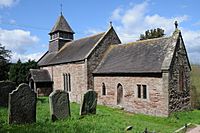Church of St Michael and All Angels, Llanvihangel-Ystern-Llewern facts for kids
Quick facts for kids St Michael and All Angels, Llanvihangel-Ystern-Llewern |
|
|---|---|
| Church of St Michael and All Angels | |

"a fine wagon roof and unusual timber-framed belfry"
|
|
| Lua error in Module:Location_map at line 420: attempt to index field 'wikibase' (a nil value). | |
| Location | Llanvihangel-Ystern-Llewern, Monmouthshire |
| Country | Wales |
| Denomination | Church in Wales |
| History | |
| Status | parish church |
| Founded | C15th century |
| Architecture | |
| Functional status | Active |
| Heritage designation | Grade II* |
| Designated | 19 November 1953 |
| Architectural type | Church |
| Administration | |
| Parish | Llanfihangel-ystern-Llewern |
| Deanery | Monmouth |
| Archdeaconry | Monmouth |
| Diocese | Monmouth |
The Church of St Michael and All Angels is a historic church located in Llanvihangel-Ystern-Llewern, Monmouthshire, Wales. It was first built in the 15th century. Over the years, it has been updated, especially in the 1800s by Thomas Henry Wyatt. Today, it is a special building known as a Grade II* listed building and is still used as an active church for the local community.
Contents
History of the Church
The Church of St Michael and All Angels has a long history, dating back to the medieval period. We don't know the exact date it was built, but parts like the main hall's roof (called the nave) and the windows were added in the late 1400s.
Updates and Renovations
In 1874, a big restoration project took place. This work was led by an architect named T. H. Wyatt. During this time, the church's bell tower, or belfry, which has a wooden base, was built. Later, in the early 1900s, the inside of the church was updated. A beautiful stained glass window was added between 1906 and 1907. This window shows a famous scene of Saint George and the Dragon and was created by Charles Eamer Kempe.
Local Connections
Inside the church, there is a special plaque that remembers Sir Joseph Bradney. He was a historian and expert on old things from Monmouthshire. Sir Joseph lived nearby at Tal-y-coed Court. He wrote a huge 12-book history about the county. The Church of St Michael and All Angels is still an important place for the community and is used regularly for services.
Church Architecture and Design
The church is built using a type of stone called "Old Red Sandstone rubble". This stone can be quite crumbly. The main parts of the church, including the nave (the main seating area), the chancel (the area around the altar), and the belfry, were all designed by Wyatt. The porch, which is the entrance area, was added a little later in 1895.
Special Features
One of the most interesting parts of the church is the roof over the nave. It's an original medieval wagon vault roof. This type of roof looks like the inside of a covered wagon. The church is recognized as a Grade II* listed building because of its "fine 15th century wagon roof" and its "unusual 19th century timber-framed belfry." This means it's a very important historical building.
 | Kyle Baker |
 | Joseph Yoakum |
 | Laura Wheeler Waring |
 | Henry Ossawa Tanner |

